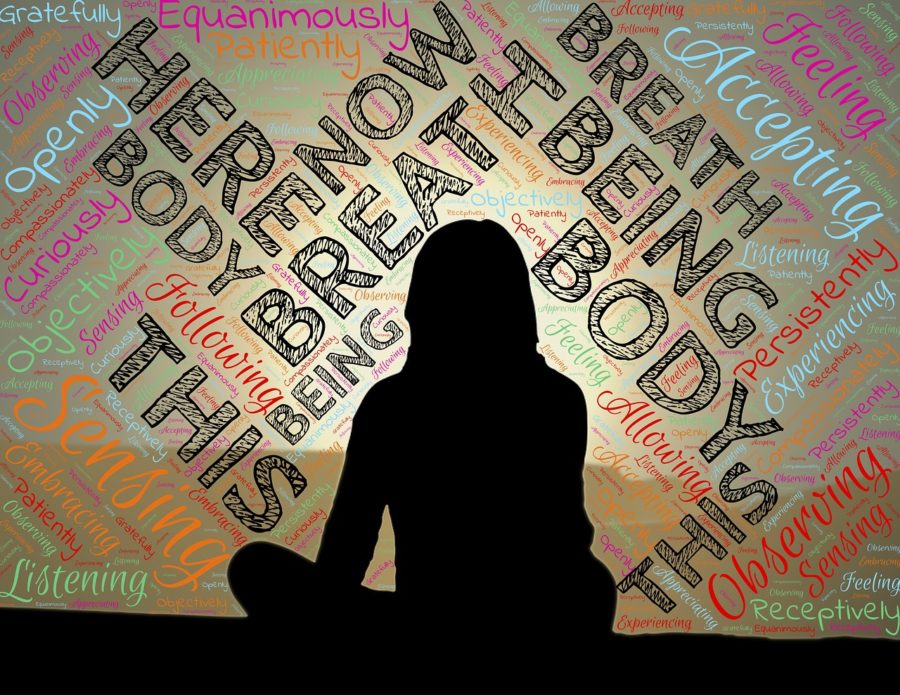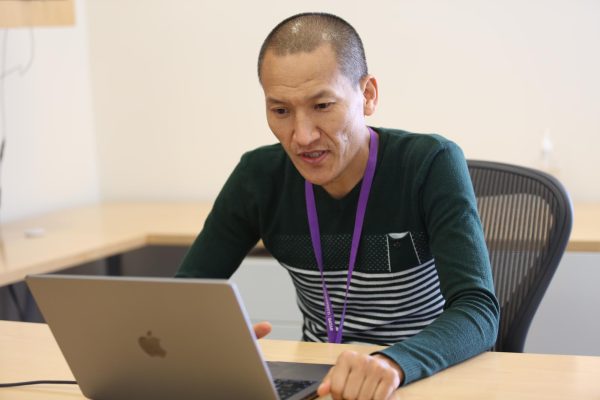Deconstructing Mindfulness
With your eyes closed, you focus only on yourself and on your breaths—following their depths and paces. You feel the air enter your body, and eventually you become aware of your minute sensations and emotions while living in the moment. This is how a mindfulness breathing activity feels and how it’s supposed to work.
For Northwestern University in Qatar student, Menna Soliman, mindfulness techniques have helped her reduce discomfort and stress caused by the unsung pressures of student life and other factors that exasperate mental health issues. After nine months of being introduced to mindfulness practices by the health and wellness director at NU-Q, Patti Collins, Soliman says that she feels grounded and more confident.
“It is important to be aware of your feelings and acknowledge them because our brain is always going negative…I am telling my brain to stop thinking negatively,” says Soliman. Through mindfulness exercises, “I am telling my brain to stop thinking negatively.”
Mindfulness allows you to maintain a moment-by-moment awareness of thoughts, feelings, and body. We are often oscillating between the past and future, but mindfulness invites us to tune into and remain grounded in the present moment, says the website of Niya Yoga, a yoga studio in Qatar.
Mindfulness is a skill that enhances adaptive coping to stressful events by the self-regulation of attention towards the present experience, and an accepting perspective towards an experience in the immediate time, according to a study by Bond University in Australia,
“It grounds me for the time being…my favorite is the chocolate meditation, though it was really weird experience, I enjoyed the appreciation that came along with it,” said Elissa Mefleh, another student at NU-Q.
At NU-Q, Collins offers a program called “Mindful Mondays” in which students are introduced to brief episodes of meditation, which is one form of practicing mindfulness. For those interested in a more involved program in mindfulness, Collins offers AWAKE (Awareness With Acceptance, Kindness, and Ease).
“This 5-week course will provide you with good foundation to participate in the more comprehensive 8-week Mindfulness-Based Stress Reduction programs NU-Q Counseling, Health and Wellness will offer in future semesters,” she said
There are many studies on mindfulness among university students to learn more about how to help them reduce the debilitations of stress and anxiety, as well as promote personal growth and resilience, Collins says. Mindfulness training is a “hot topic” in the media, and it is increasingly being integrated into a wide variety of settings, including healthcare, K-12 schools, university campuses, workplaces, professional sports teams, governmental agencies, the military, and prisons.
In fact, teenagers showed positive attitudes and responses after a 5-week mindfulness meditation course in a University of Vermont study. All outcome measures showed significant improvement, with participants who completed the program showing decreased state and trait anxiety, enhanced social skills, and improved academic performance.
Farah Al-Sharif, a junior at NU-Q also describes her student life as being self-destructive, until she began meditating using an application called Waking Up to calm her nervous episodes and help with bad sleeping patterns. “It’s helped me calm down when things get really out of hand just for a brief moment. And sometimes I need that brief moment to carry on the rest of my day,” she said.
Similarly, a Bond University study mentioned that the aptitude of mindfulness raises one’s awareness of momentary and fleeting nature of negative, adverse thoughts and body sensations, which leads to more flexible and measured responses to stress. This is contrasted with habitual judgments and interpretations of events, which trigger strong emotions, and contribute to poor mental health.
For example, we often are not aware of how much we are actually eating or aware of the quality of what we are consuming. We can then feel unsatisfied with our meal, and despite feeling full, we may not be nourished. “If instead, we mindfully eat—noticing the colors, the smells, the way the food feels as we chew it, the way the taste changes, and even the sounds that foods make—we are more in that moment and are able to enjoy our food,” said Elena N. Lopez Khoury, assistant director, Student Wellness and Counseling Center at Georgetown University in Qatar.
However, mindfulness is not a magic wand to make all problems go away in an instant. At an event in 2016, Weill-Cornell Medical College Qatar psychologist and learning support specialist, Dr. Robert Beilke, said that it’s important to note it [mindfulness] is not going to suddenly make everyone happy and fulfilled. Rather, if it becomes a regular practice and a mindset, we will live with greater intentionality, be more likely to achieve goals, and treat ourselves with self-compassion. Over time, this will help people gain greater fulfillment and happiness from life as they live more fully in the present.
It can be said that mindfulness may not work for everyone. It often sets high expectations of immediate improved feelings, and when they do not come, a person becomes even more unsatisfied, says Jasna Chalangal, a student at WCMC-Q.
Additionally, concentrating on mindfulness activities is not easy either. “It didn’t work because I would get bored easily…I wanted fast results and they didn’t come so I just gave up. I found that fulfilling my responsibilities was the thing that best kept me feeling mindful,” said Ena Palaska, a sophomore at NU-Q.
Besides meditation, there are other activities that can be considered mindful in nature. Maryam Gamar, a sophomore at NU-Q, has been journaling, doing breathing exercises and practicing yoga for years. She does these on her own with no guidance. “The main reason I do them is to reduce stress,” she said.
Northwestern University has an website dedicated to breathing and other exercises of a mindful nature, which can include just observing your surroundings as you walk. The website presents exercises based on the following topics: test anxiety, stress, feeling overwhelmed and sleep, to help students access quick help without having to meet with a professional.
Practicing being mindful in everyday activities, such as eating, walking, listening, brushing, exercising, can help students in a variety of ways. Some of those improvements may be in increasing concentration, feeling more calm and focused even in stressful situations, lowering feelings of depression and anxiety, improving eating habits, improving sleep, and building resilience to better manage difficult situations, according to Khoury.
In Collins’ AWAKE program, she introduces body scan meditation, mindful eating and mindful walking, among other theoretical and personal mental health development activities. Theoretical activities allow participants to understand how mindfulness works in terms of thoughts and emotions. These all entail and develop a sense of mindfulness, an ability to communicate feelings and practice self-compassion.
“Being more awake in our own lives allows us to see the beautiful and the challenging as they arise in the moment. In turn, this awareness helps us appreciate the positives and respond intentionally to the difficult,” added Collins.













